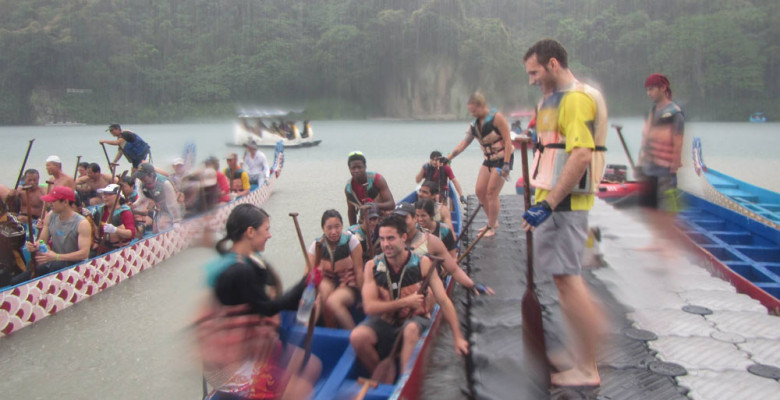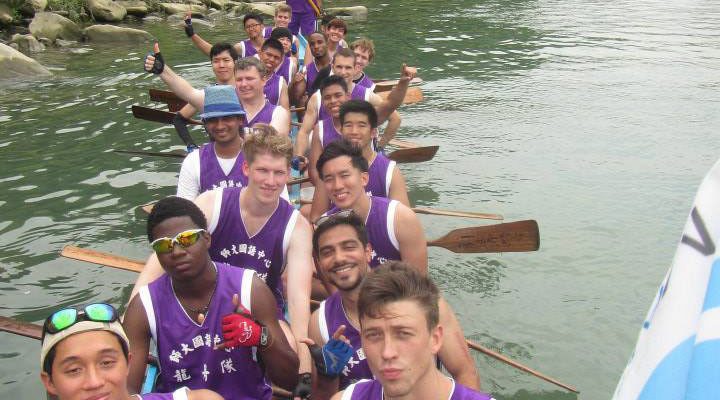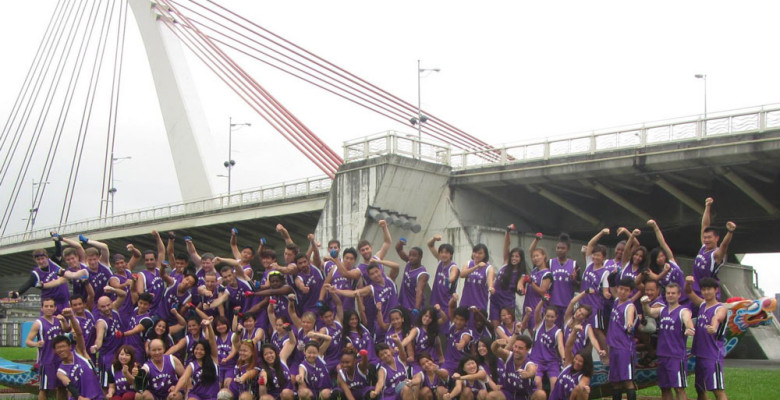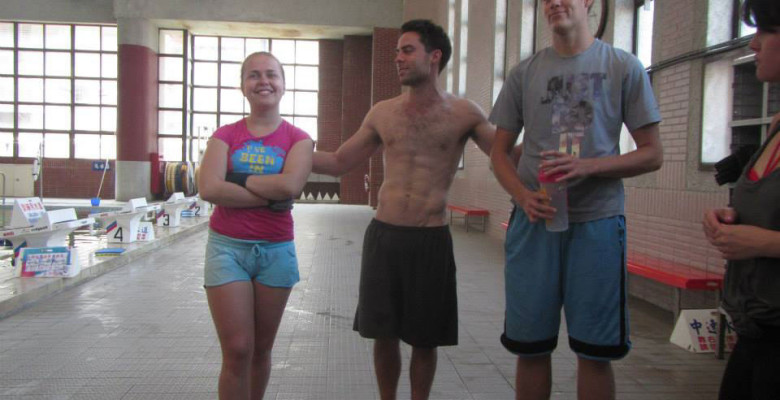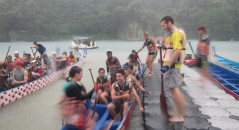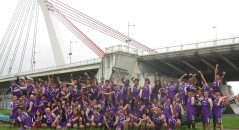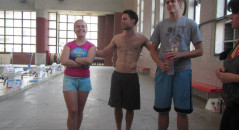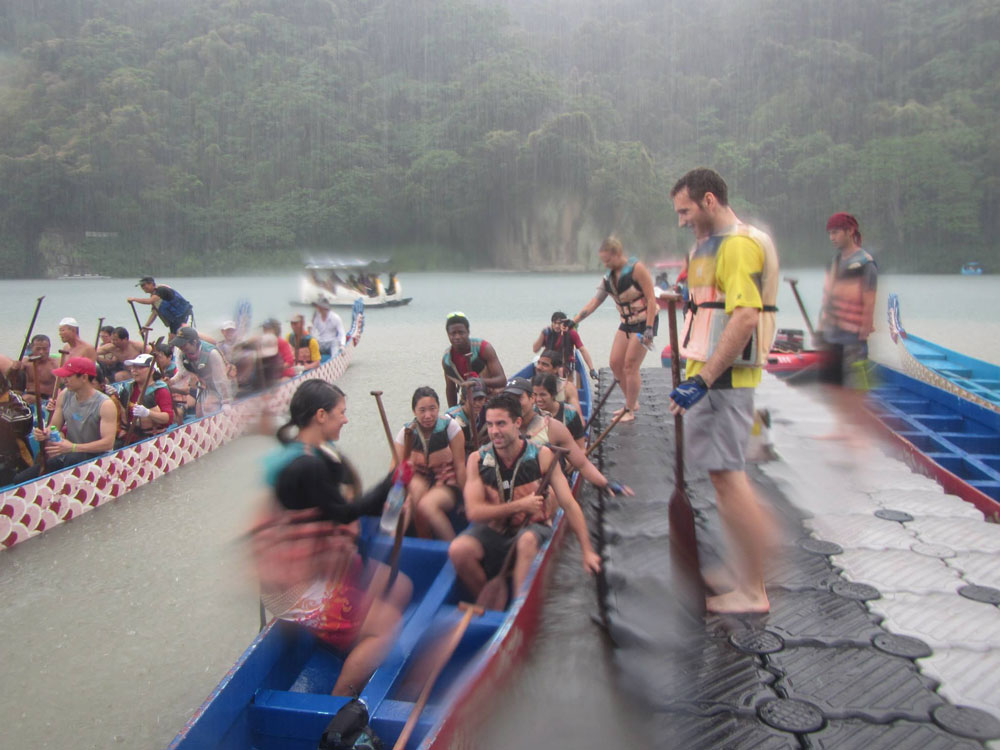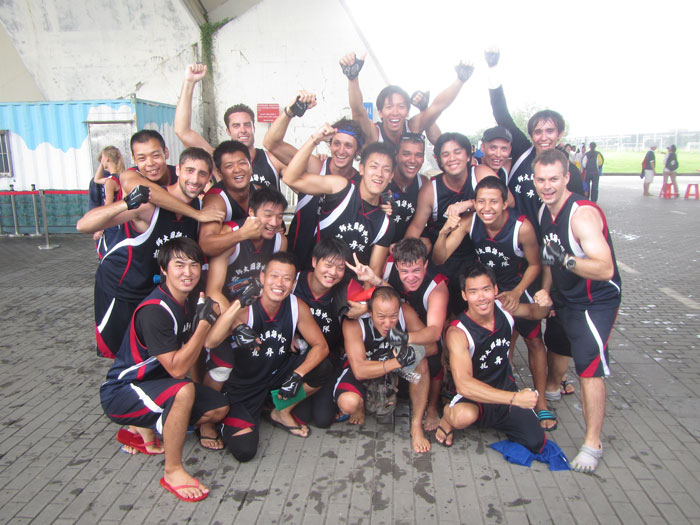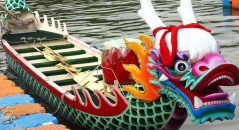Dragon boat races have been held in Chinese communities around the world for more than 2,000 years during the Dragon Boat Festival, which is on the fifth day of the fifth lunar month; this year’s festival falls on June 2. The Mandarin Training Center (MTC) has been fielding two to three teams—a men’s team, a women’s team, and more recently, a mixed team—to compete in the Taipei City dragon boat races since 1980 and is one of the strongest “international” teams on the island, primarily due to its intense training schedule and extremely experienced coach, who has been coaching and steering the various teams since year one. Rain-or-shine, the team practices three hours per day, five days per week, starting in early March. It is this intense training that has allowed the MTC to usually do well in the competition: In 2013, both the men and women’s teams made it to the finals, placing 4th out of 61 teams and 2nd out of 19 teams, respectively.
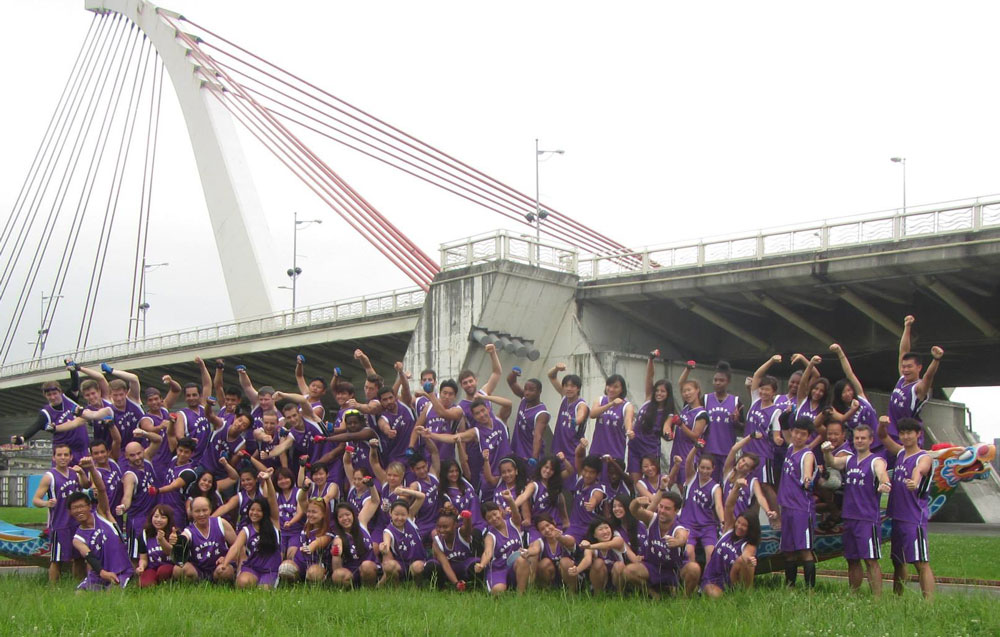
The entire MTC dragon boat team poses for a group photo together in the Dajia Riverside Park below Dazhi Bridge.
In the past, the Taipei City dragon boat competition had an International Division for foreign teams traveling from abroad, and several local divisions (Taipei City Government, Taiwan Provincial Government, Society or School divisions) for the Taiwanese teams. For many years, the MTC team held the distinct honor of being one of the only local teams to compete in the International Division, which it was allowed to do since all of its members were foreign students from more than a dozen different countries. A literal United Nation of paddlers, the MTC team didn’t represent a single country in the International Division, but many. This huge mix of different backgrounds and cultures creates an exciting atmosphere during training, and often attracts local media during the races as curious Taiwanese strive to understand just how exactly this ancient cultural tradition and sport is influencing foreigners living in Taiwan.
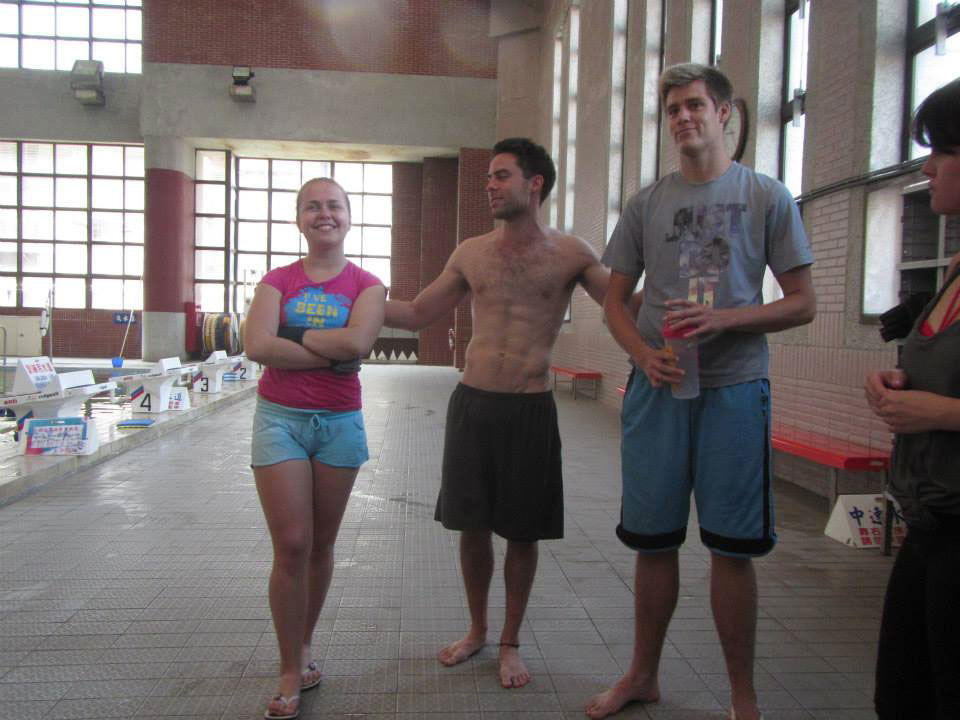
The overall captain of the MTC team, Evan Moore (center), introduces the men’s captain Lukas Engström (right) and women’s captain Anna Sergeeva (left) during a training session held at the NTNU swimming pool.
The overall captain of the MTC team is Evan Moore from the United States. “Going from normal team member my first year, to captain this year has been a huge jump. The experience this year has been completely different than it was last year. So much more responsibility this year, obviously, as well as the fact that I am familiar with the system and people this year, compared to last year when everything was new.” The fact that Evan was captain for his high school and university swim teams helped him to make the transition from team member to captain with only a season’s worth of experience. The first one to two months of training takes place at the National Taiwan Normal University (NTNU) track and field. Running, sit-ups, push-ups, and various stretches are done to build up strength and endurance while increasing flexibility. Twice per week the team hits the NTNU pool too—not to swim, but to get used to holding a paddle properly and practice paddling. Assisting Evan are two co-captains, one for the men’s team & one for the women’s team. Anna Sergeeva, who hails from Russia, is the captain of the women’s team. A first time paddler, her only prior experience playing team sports was volleyball in high school. “Dragon boat is a bit different, volleyball is more aggressive I think. However, trainings are the same—hard—and you should have team spirit as well.” Originally not very keen on joining the team, she reluctantly did so when a friend convinced her to participate, and now she’s hooked. “Being a co-captain is like being a mom for a big family. Your teammates are your kids, so you worry about them, take care of them, and love them.” Evan agrees, adding, “I feel like when people get injured it’s from me pushing too hard, and it gives me a really terrible feeling, like I’m responsible for it. That’s probably one of the hardest things to deal with, as well as when people are not enjoying themselves.”
A month or so prior to the competition, the race organizers start allowing registered teams to use their dragon boats for practice, and the real training begins. The MTC registers for both the Taipei City and New Taipei City competitions, so 3-4 times per week the team practices on the Keelung River below Dazhi Bridge, and 1-2 times per week the team practices on Hsintien Creek at Bitan. Aside from Evan, this year’s MTC team has roughly a dozen veteran paddlers, including a handful with more than two years experience. Once such paddler is Gael Lim from France, who has participated on the MTC team for four straight years. No stranger to sports, Gael played handball, basketball, and soccer growing up, and preferred playing team sports over individual sports. “However, the notion of ‘team’ is even more important in dragon boat racing. In basketball or handball a team can scrape by with a win by relying on two or three great athletes. Not so in dragon boat, where you need your teammates even more so than most of the sports I used to play. That’s why it’s so special to me.” Despite his many years of experience, Gael does not see himself as the leadership type and has always declined the role of captain. “Just give me a paddle, put me anywhere in a dragon boat, and I’ll be happy!”
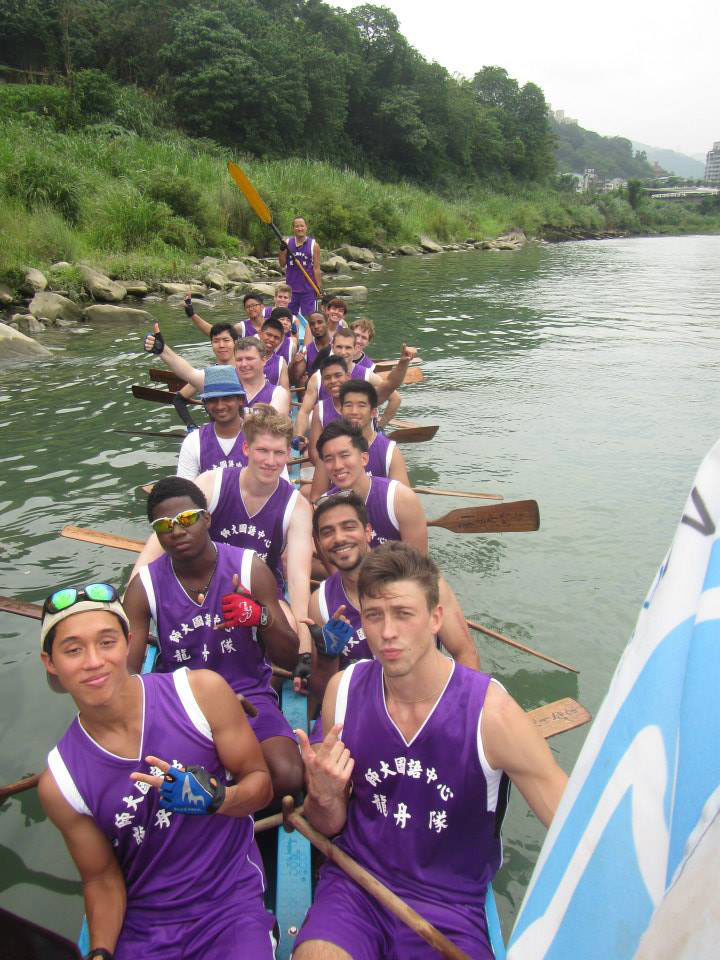
The MTC men’s team pauses for a photo during the New Taipei City competition’s Eye-dotting ceremony held on May 17, 2014, at Bitan.
Behind the scenes of all the training and exercise routines is the Mandarin Training Center itself, with Lisa Liao at its center. Lisa is the MTC liaison in charge of managing the language center’s dragon boat teams and has been doing so for the past five years. All the paper work required for putting the team together—registering the three teams for the races, ordering everyone’s uniforms, arranging transportation to and from practice, communicating with the coach, ensuring all participants are properly insured, managing the logistics behind the training schedule—are her responsibility. “The process has gotten easier over the years as I became more and more familiar with what was going on. That being said, each year is a brand new team with 60-70 students from a myriad background of races and cultures, and figuring out the best way to cultivate team spirit among such a diverse group is always a task in itself.” With its intense training schedule, confident paddlers from around the world, and unbridled enthusiasm—or so-called “dragon boat spirit”—the MTC team is not only a favorite of the media, but also an exciting team for both local and foreign fans to support come race-time. So if you’re free this Dragon Boat Festival, come on down to the Dajia Riverside Park and help cheer on the loudest team wearing purple uniforms! To get you in the mood, this is what happened in the 2013 finals: It is 4:50 p.m. on June 12 and the final race of the day is about to begin in the 2013 Taipei Dragon Boat Festival. It is the Men’s Open Division finals, and the top four teams out of 61 are facing off against each other for the coveted Presidential Cup and NT$400,000 in prize money. The Mandarin Training Center’s (MTC) men’s team readies itself at the starting block, extremely excited to have reached the finals; the last time a men’s team from the school reached the finals was a long eight years ago, when the 2006 team managed to place 4th out of a field of 28 teams.
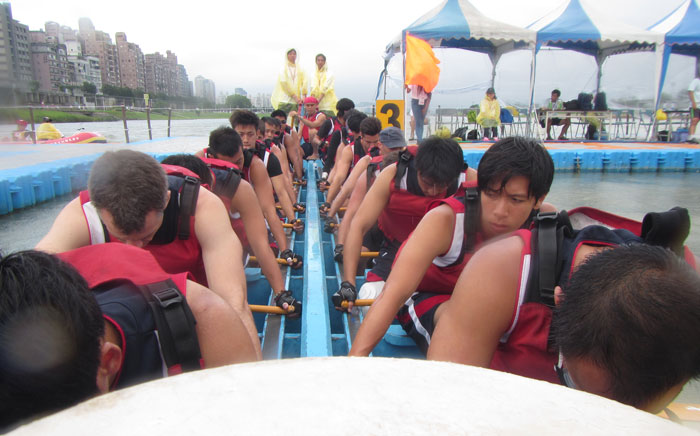
Getting ready for the race…
The gun goes off, and the boats launch themselves down the course amidst the pounding of drums and the cheering of thousands of spectators. The team from Vanung University takes a substantial lead into first and never looks back, but the remaining three teams are neck-to-neck all the way down the 500-meter course. Three-and-a-half months of intensive training are finally being put to its ultimate test for the 18 paddlers on the MTC men’s team as they thrust their oars into the water in perfect unison. The finish line approaches, and the flag catchers quickly scramble onto their respective dragon boat’s heads, arms outstretched as far as possible to snag the flag from the buoy floating at the end of their lane. The ending is a blur, with a flurry of flags flying up into the air almost simultaneously: but the end result is the MTC men’s team has placed 4th yet again. Still, the times are extremely close, with the second place team coming in at 2:05.51, the third place team coming in at 2:05.53, and the MTC team coming in at 2:06.39; less than a fraction of a second between each.

